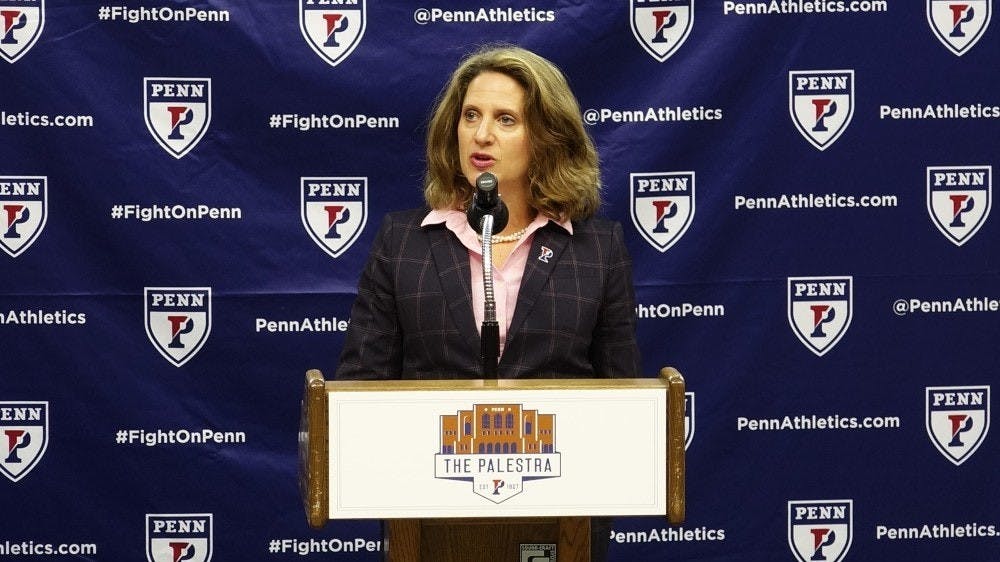Penn Athletics had an eventful year in 2018, highlighted by the second annual Ivy League Basketball Tournaments, a near upset of No. 1 Kansas in March Madness, the first player to be drafted to the NFL since 2002, an individual national championship for women’s squash star Reeham Sedky, and six Ivy title runs spread across each of the three seasons, including men’s fencing and women’s track and field, lacrosse, and soccer.
It wasn’t all titles and glory, however. Volleyball won just six games all season under their third head coach in as many years, football struggled with injuries on defense and uncertainty at the quarterback position, softball coach Leslie King was accused of mistreatment by former players, former men’s basketball coach Jerome Allen admitted to accepting bribes, and the administration added advertising to the Palestra court.
With a new year full of big games, fresh faces, and untold stories on the horizon, it’s time to suggest a few New Year’s resolutions for Penn Athletics.
Commit to an emphasis on student-athletes’ mental health
Penn student-athletes have had well-publicized struggles with mental health in the last decade or so. But even beyond the noteworthy deaths of football players Kyle Ambrogi and Owen Thomas and track’s Madison Holleran, lesser-known athletes continue to silently struggle with mental health related issues.
Athletes face time constraints and stresses unique to the Penn student body at large. The physical and emotional exhaustion that comes with playing a sport nearly every day shouldn’t be overlooked. Penn’s administration should do a better job of emphasizing student mental health broadly, but athletes are one population who face more risk than others yet receive disproportionately less support.
Last year, fencer Ashley Marcus unsuccessfully lobbied the Athletics Department for increased athlete access to Penn Counseling and Psychological Services. Marcus’ proposal would have stationed at least one therapist in an Athletics Department building, with hours outside of the traditional work day to accommodate athletes with busy practice schedules.
Penn Athletics has made some gestures towards a more comprehensive student-athlete mental wellness program — most notably with the hiring of Associate Athletic Director Andrea Wieland, who oversaw mental health and performance at IMG Academy in Florida. However, since Wieland’s hiring in July, the department has yet to announce any new initiatives or programs to help promote athletes' mental well-being. That must change in 2019.
Return to the men’s basketball NCAA Tournament
After beating Harvard in the Ivy League Tournament, Penn men’s basketball received national press as the likeliest No. 16 seed to beat a No. 1 in years. Ultimately, the Quakers failed where Maryland-Baltimore County succeeded, but the excitement and buzz of March Madness gave the program a tangible boost.
This season, the Quakers earned local and national press again by upsetting defending national champions Villanova. Continued success will keep the team in the spotlight, increasing attendance, convincing more alumni to donate, and inspiring more recruits to commit. The result is that the success of men’s basketball helps elevate the entire department as a whole.
The Quakers have positioned themselves well to do that, despite the loss of junior guard Ryan Betley. With the odds of an at-large bid negligible and the start of conference play next week, the real season is about to begin. For the sake of the whole department, men’s basketball should take advantage.
Return to the top in historically strong sports
Certain Penn sports have a history of dominance but fell off track in 2018. There is no good reason why those sports cannot return to the top of the conference.
Football is one of these. After back-to-back titles in 2015 and 2016, the Quakers have floundered in the middle of the Ancient Eight for two seasons. If the quarterback situation can finally be resolved and the team stays healthy, a return to the top is very much in play next year.
Women’s squash won an Ivy title in 2015 as well, and placed second in both the conference and the nation for two years after that. Last year, despite having the individual national champion on its roster, Penn finished sixth in the conference. 2019 should bring an improvement in that regard in Sedky’s final season.

THEODOROS PAPAZEKOS is a College junior from Pittsburgh, Pa. and is Senior Sports Editor for The Daily Pennsylvanian. He can be reached at papazekos@thedp.com.









